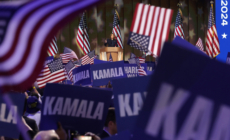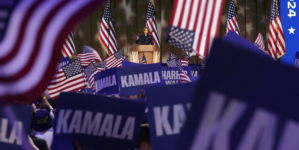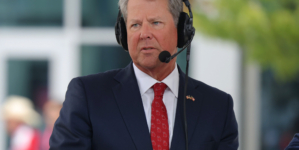-
Jussie Smollett’s Conviction for False Hate Crime Claim Is Overturned - 6 mins ago
-
Mom Dreamed Cat Would Meet Newborn—Touched by Reaction When It Happened - 23 mins ago
-
Nearly half of L.A.’s homeless budget went unspent, controller finds - 24 mins ago
-
Brazilian Police Accuse Bolsonaro of Plotting a Coup - 50 mins ago
-
DEI Made the Democratic Party Less Diverse | Opinion - 58 mins ago
-
Burning tree in South L.A. leads firefighters to a grim discovery - about 1 hour ago
-
Brian Kemp Tapped to Head Republican Governors Association - 2 hours ago
-
Netanyahu, Wanted by a Landmark Warrant, Now Faces a Smaller World - 2 hours ago
-
South Pasadena joyride ends in reckless evading for 13-year-old - 2 hours ago
-
Shedeur Sanders Is Not a Top-20 Prospect in 2025, per NFL Draft Expert’s Big Board - 2 hours ago
Boston Mayor Vows to Fight Trump’s Mass Deportation Plans
Boston Mayor Michelle Wu has drawn a clear line against Donald Trump’s proposed mass deportation plans, vowing to maintain the city’s sanctuary status and protect immigrant residents when the president-elect returns to the White House in January.
“What we can do is make sure that we are doing our part to protect our residents in every possible way,” the Democratic leader said during a Sunday interview with local news station WCVB’s On The Record. “We are not cooperating with those efforts that actually threaten the safety of everyone by causing widespread fear and having large scale economic impact.”
Newsweek contacted the Trump transition team via email on Monday for comment.
Trump-Vance Transition Spokesperson Karoline Leavitt previously described the upcoming effort as “the largest deportation operation of illegal criminals, drug dealers, and human traffickers in American history.” The president-elect recently responded “TRUE” on his Truth Social platform to reports that he was considering declaring a national emergency to deploy military assets in the effort.
Wu’s stance reinforces Boston’s existing Trust Act, which she supported both as a city councilor in 2014 and during its 2019 revision. The ordinance prohibits Boston police from detaining or arresting individuals solely for immigration enforcement purposes, though it maintains allowances for police cooperation with Immigration and Customs Enforcement (ICE) on criminal investigations like human trafficking.
“The last thing we want is for people who are part of our economy, part of our school system, part of our community and the fabric of our city, to feel that all of a sudden they have to retreat into the shadows,” Wu emphasized, stressing the importance of ensuring undocumented residents feel secure accessing essential city services.
The conflict between local and federal authorities extends beyond Boston’s city limits. Massachusetts Governor Maura Healey recently declared that state police would “absolutely not” participate in immigration enforcement operations, promising to use “every tool in the tool box” to protect state residents.
Trump outlined several enforcement measures during his presidential campaign. At a November 4 rally, he pledged to invoke the 1798 Alien Enemies Act “to target and dismantle every migrant criminal network operating on American soil.” His plans include establishing a naval blockade and deploying Special Forces against cartels, which he aims to classify as terrorist organizations. Reports indicate his team is already in discussions with private prison companies about expanding detention facilities.
However, the economic implications of mass deportations have raised concerns. The American Business Immigration Coalition estimates agricultural output could fall between $30 and $60 billion if Trump’s policy is implemented, with farmers expressing alarm about potentially losing their workforce.
Massachusetts Attorney General Andrea Campbell has indicated that attorneys general nationwide stand ready to mount legal challenges. This builds on the state’s previous confrontations with Trump policies—during her tenure as attorney general, Healey filed nearly 100 lawsuits against the Trump administration, including a challenge to the travel ban on several Muslim-majority countries.
“I think the office has demonstrated that it has led in the past, and will continue to on every issue,” Campbell told reporters.
The growing rift between federal and local priorities is highlighted by recent ICE operations in the Boston area. The agency reported apprehending a Colombian individual who had been arrested on charges including enticing a child under 16 and distribution of obscene matter, stating that their previous detainer request had been ignored by local authorities.

Wu acknowledged the complex relationship between federal and local authorities while maintaining her protective stance toward immigrant residents.
“Elections have consequences, and the federal government is responsible for a certain set of actions, and cities, no individual city, can reverse or override some parts of that,” she said while emphasizing the city’s commitment to ensuring access to emergency services and schools regardless of immigration status.
Source link

















